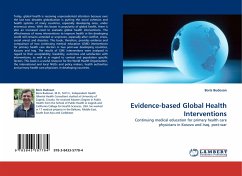Today, global health is receiving unprecedented attention because over the last two decades globalization is putting the social cohesion and health systems of many countries, especially developing ones, under enormous stress. With this boom in popularity of global health, there is also an increased need to evaluate global health interventions. The effectiveness of many interventions to improve health in the developing world still remains untested or unproven, especially after conflict, crises, social unrest and disasters. This book, therefore, provides evidence and comparison of two continuing medical education (CME) interventions for primary health care doctors in two post-war developing countries, Kosovo and Iraq. The results of CME interventions were analyzed in regard to their acceptability, feasibility, outcomes and satisfaction with interventions, as well as in regard to context and population specific factors. This book is a useful resource for the World Health Organization, the international and local NGOs and policy makers, health authorities and primary health care physicians in developing countries.
Bitte wählen Sie Ihr Anliegen aus.
Rechnungen
Retourenschein anfordern
Bestellstatus
Storno








